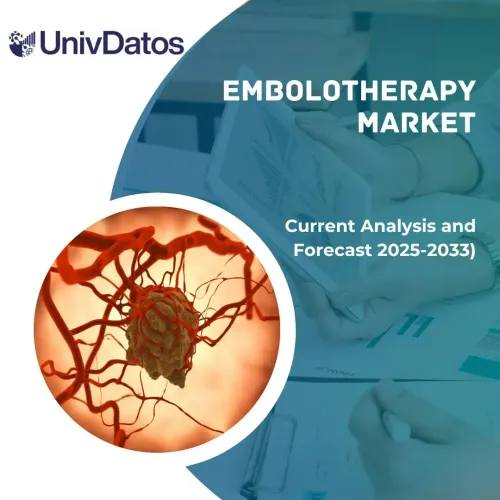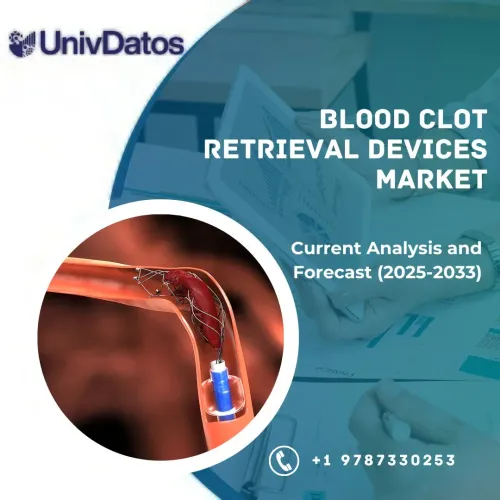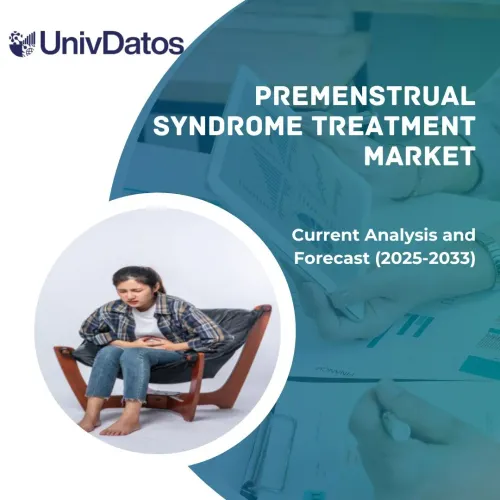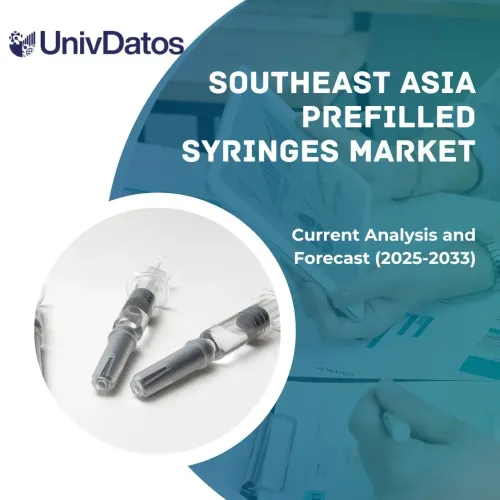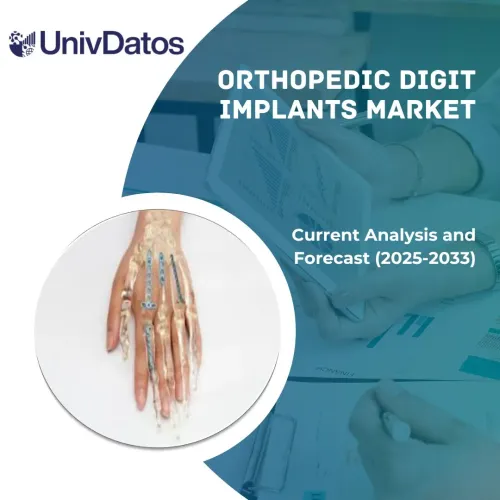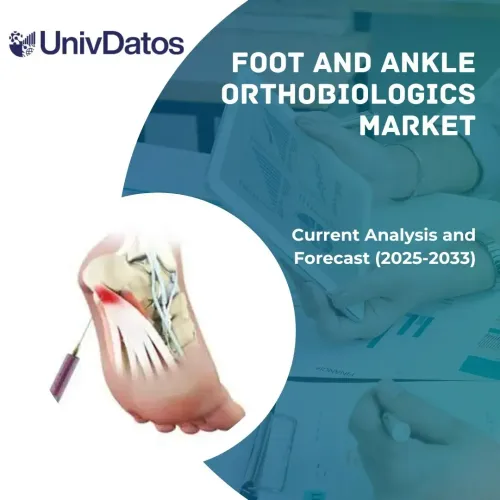- Home
- About Us
- Industry
- Services
- Reading
- Contact Us
Pet Bird Health Market: Current Analysis and Forecast (2025-2033)
Emphasis on By Product (Pharmaceuticals, Diagnostics, Others); By Application (Parasitic Infections, Bacterial Infections, Others); By Distribution Channel (Online, Offline); and Region/Country
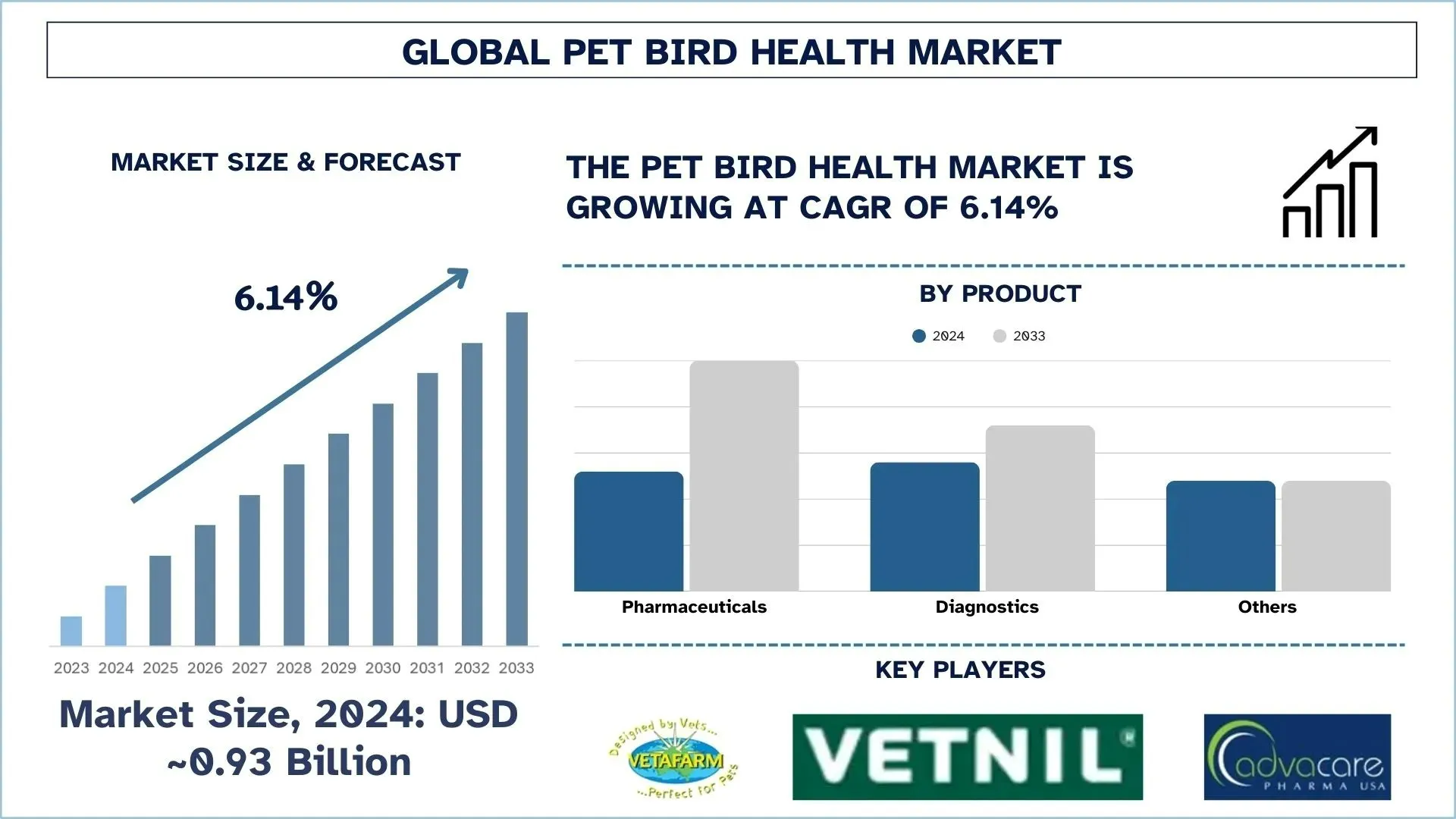
Pet Bird Health Market Size & Forecast
The pet bird health market was valued at USD 0.93 billion in 2024 and is expected to grow to a strong CAGR of 6.14% for the forecast period (2025-2033F) due to the increasing pet bird ownership, advancements in avian veterinary medicine, and growing awareness of avian health.
Pet Bird Health Market Analysis
There has been an increase in the pet bird health market due to the canaries and budgerigars as companion animals, the demand for proper care, and specialized health products. It maintains the health and well-being of pet birds that including food supplements, medications, vaccines, and veterinary care. Furthermore, greater awareness of bird health needs, rising pet ownership, and the increased spending on pet care are the factors driving the growth of the market. Additionally, advancements in avian medicine and the expansion of pet-focused retail and e-commerce platforms are further accelerating the pet bird health market.
Companies in the pet bird health market are coming up with smarter solutions to care for birds and connect with more customers. The companies are coming up with new tech tools, like trackers and automatic feeders, that help bird owners keep an eye on their pets’ health more easily. The growing global warming and greenhouse effect have prompted consumers to start demanding sustainable products, leading companies to create more eco-friendly products. Products such as naturally breaking toys and eco-friendly packaging are further appealing to environmentally conscious buyers. The companies are also using social media platforms and websites to share and promote helpful tips. There are now more personalized supplements made just for certain bird species. Additionally, they are working with veterinarians and making products available online. For further growth, companies should create tailored products to the unique needs of different bird species and new regions.
Pet Bird Health Market Trends
This section discusses the key market trends influencing the various segments of the pet bird health market as identified by our research experts.
The rising trend of personalized nutrition
The emerging trend of personalized nutrition is perpetuating growth in the pet bird health market by encouraging owners to choose diets tailored to their bird’s species, age, and health needs. Seeds are not the only appropriate food for them, as seed diets will not give a longer lifespan and may further inhibit viral, bacterial, and fungal infections. For illustration, sunflower seeds have 49% fat and may lead to human-like diseases such as fatty liver, diabetes, obesity, bad skin, etc. Different bird species have different nutritional requirements, and factors like age, activity level, and health conditions also play a role. The demand for customized diets, health plans, and supplements has increased the need for more personalized nutrition in the pet bird market. Companies are adjusting to what bird owners want by offering specific products and even one-on-one guidance. Since many people now see their birds as part of the family, they’re more open to spending extra on nutrition that fits their bird’s unique needs. This helps prevent health problems and supports a longer, healthier life. At the same time, this growing interest in tailored care is creating room for more specialized products and services, helping the market grow even further.
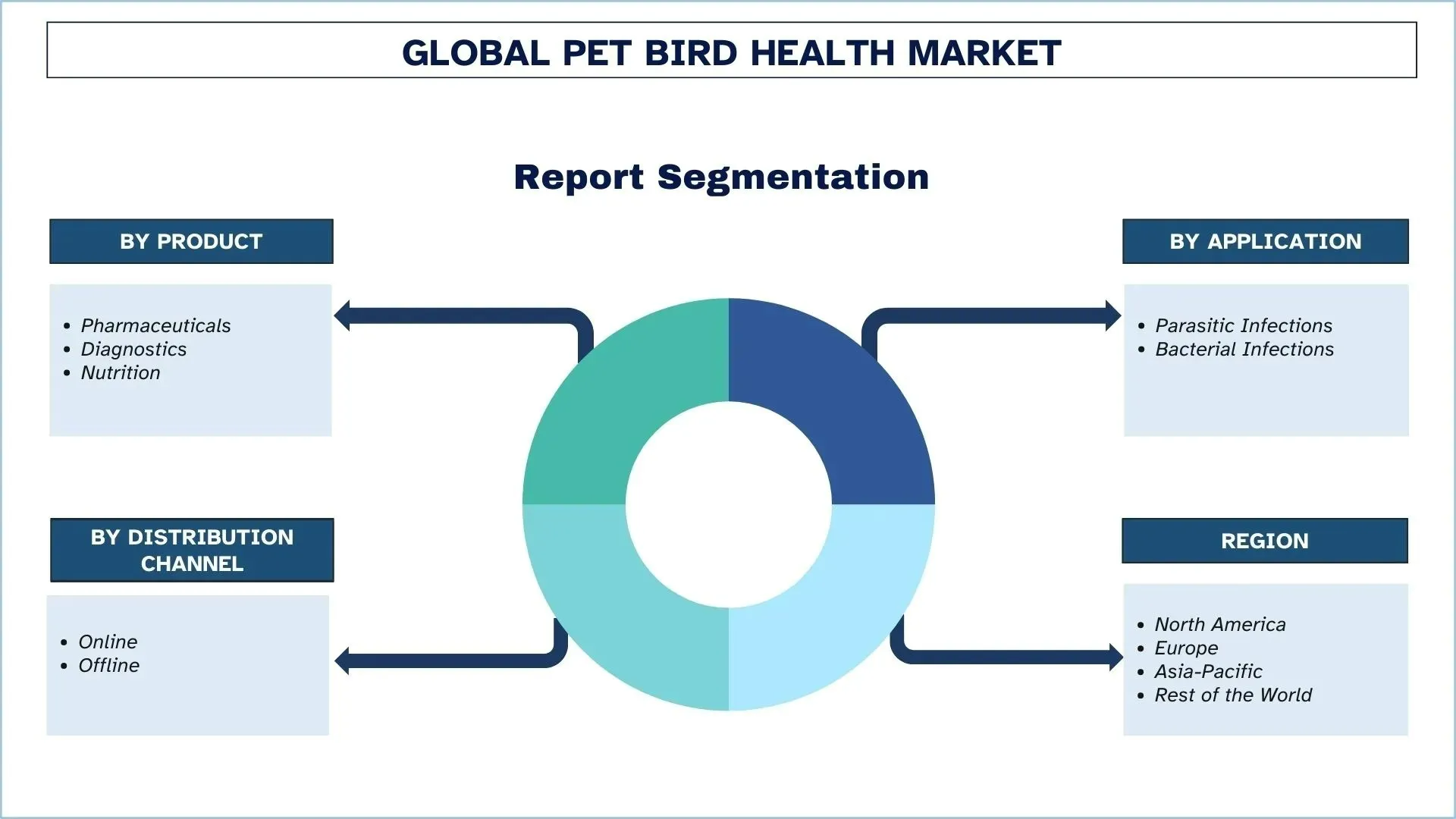
Pet Bird Health Industry Segmentation
This section provides an analysis of the key trends in each segment of the global Pet Bird Health market report, along with forecasts at the global, regional, and country levels for 2025-2033.
The pharmaceutical pet bird health product dominates the pet bird health market.
Based on the product, the market is segmented into pharmaceuticals, diagnostics, and others. The global demand for pharmaceuticals for pet bird health is growing rapidly as more avian pet owners are recognizing the importance of proper medical care. As birds can suffer from a variety of issues, such as infections, parasites, and respiratory problems, they usually do not reveal any illness symptoms until they are serious. With the increasing awareness of avian pets' health, people are increasingly preferring the treatment and medications to prevent their sickness. Veterinarians are also prescribing more targeted drugs specifically designed for them. With improved access to avian pets and improved products, bird owners are more willing to use pharmaceuticals to keep their pets healthy and extend their lifespan.
Parasitic infections dominate the Pet Bird Health market
Based on application, the market is segmented into parasitic infections and bacterial infections, and others. Among these, the largest portion of global revenue in 2024 came from parasitic infections. Parasitic infections have become a major concern for the pet birds' health, as they are mostly kept inside closed doors, breeding parasitic infections. Musty environmental conditions, untidy cages, improper cleaning, and crowding can all contribute to intestinal worm, mite, and lice infestations. Additionally, imported or breeder birds may carry parasites that may spread to humans as well. Owners seek treatment when they become more conscious of symptoms like itching, feather loss, leading to an increase in demand for products connected to products. Veterinarians are also diagnosing these infections more often, making parasite prevention and treatment a growing part of bird healthcare.
North America held a dominant share of the Pet Bird Health market in 2024
North America held a significant share of the global market due to the strong pet-ownership culture and the increasing consciousness of bird welfare. Many households in the North America region consider birds as their family members and invest extravagantly in them. This region also benefits from better access to avian veterinarians, advanced healthcare products, and a wide range of options both in physical pet stores and online. Furthermore, the growing popularity has made bird health a growing priority across North American homes. According to the U.S. Fish & Wildlife Service, many of the 1,106 species of birds protected under the Migratory Bird Treaty Act are experiencing population declines due to increased threats across the landscape. Of those 1,106 species, 89 bird species are listed as either threatened or endangered under the U.S. Endangered Species Act. An additional 269 species are listed as Birds of Conservation Concern, in one or more geographic scales.
The U.S. held a dominant share of the North American Pet Bird Health market in 2024
The United States Pet Bird Health market has exhibited prolific performance in 2024, as more people are keeping avians as their pets. This industry is integral to the United States economy as it creates jobs and generates a major share of revenue. Manufacturers produce medicines and vaccines, flea and tick protection, and nutritional products produced by the bird owners. Hence, the interlinked economic impact of bird health manufacturers and the linked industries has far-reaching prospects. The pet bird health market has been increasing exponentially due to the increased demand for protein food, prevalence of zoonotic and foodborne diseases, pet ownership, and advancements in vaccines and medications. The pet bird health industry creates innovative products that support all types of pet birds across the country. According to the Bureau of Labor Statistics, Americans spent nearly USD 103 billion on their pets in 2021. Thus, on average, the USD 90.5 million pet-owning households across the country each spent USD 1,137 on their pets, including USD 393 million on veterinary services such as routine visits, surgery, treatments, and vaccinations, and USD 263 million on pet purchases and supplies, including medicine.
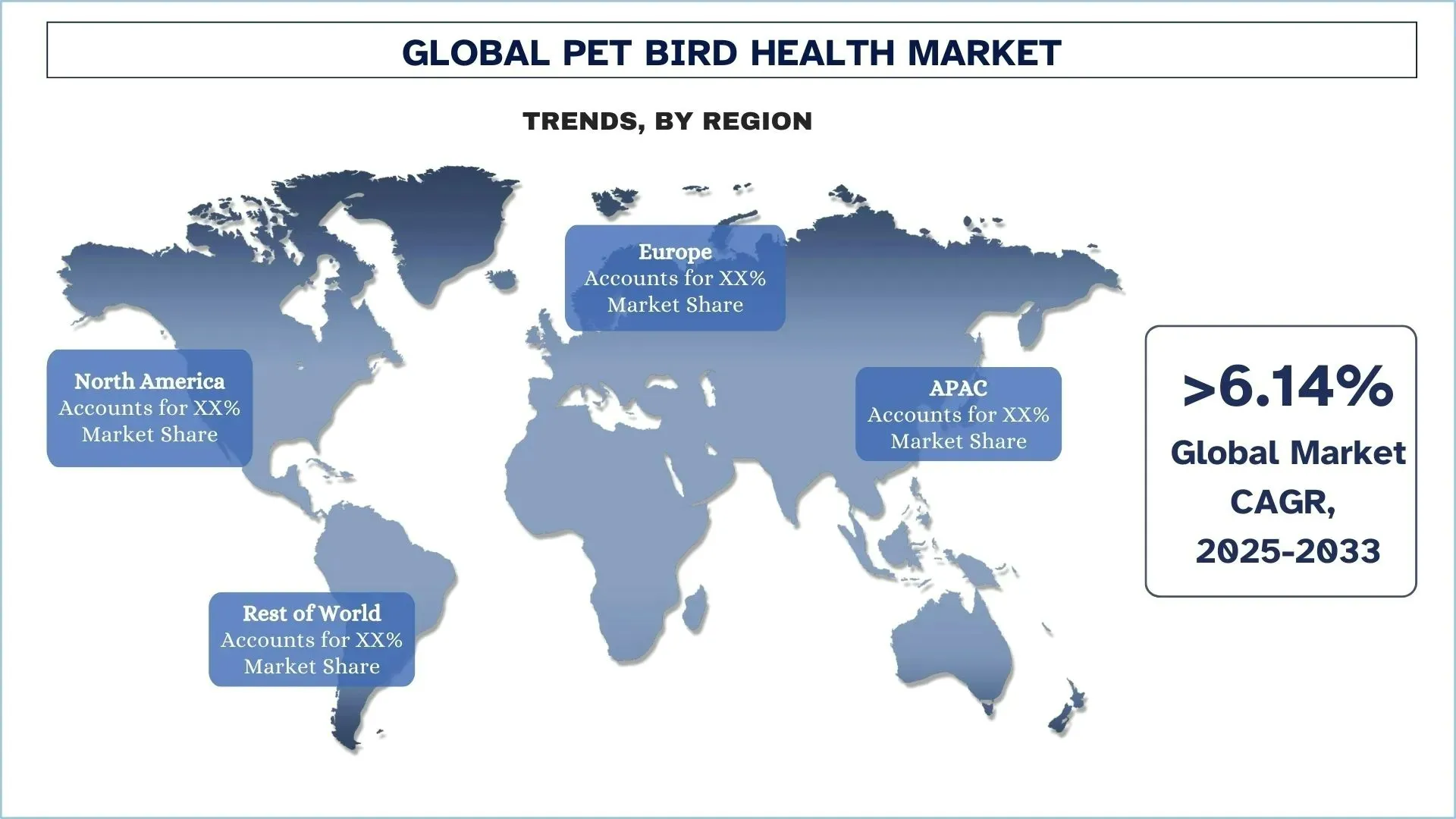
Pet Bird Health Competitive Landscape
The Pet Bird Health Market is competitive and fragmented, with several global and international market players. The key players are adopting different growth strategies to enhance their market presence, such as partnerships, agreements, collaborations, new product launches, geographical expansions, and mergers and acquisitions.
Top Pet Bird Health Companies
The major players operating in the market are Thermo Fisher Scientific Inc., Vetafarm, Vetnil, AdvaCare Pharma, INDICAL BIOSCIENCE GmbH (Vimian Group AB), Kaytee Products, Inc., HomeoPet LLC., Merck & Co., Inc., Lafeber Company, and Global Harvest Foods, LLC.
Pet Bird Health Market News
July 10, 2024: Bird Buddy, the award-winning tech for nature company, launched its new AI product called Nature Intelligence which delivers unique bird identification. Nature Intelligence includes additional features, asked for by the Bird Buddy community, such as Bird Care, Pet Alerts, and additional species recognition. Concurrently launched is the Nature Connected Home functionality, which directly connects Bird Buddy's Smart Feeder, a TIME Best Invention of 2023, and Smart Hummingbird Feeder to home devices, live streaming nature.
Apr 30, 2025: Bird Foods, a part of the Bird group, aggressively expanded its presence in India's QSR and food court sector, aiming for 100 outlets in the next three years. The company plans to increase from 23 outlets by June 2025 to 35 by March 2026, focusing on high-traffic locations and exploring tier-2 cities.
Pet Bird Health Market Report Coverage
Details | |
Base year | 2024 |
Forecast period | 2025-2033 |
Growth momentum | Accelerate at a CAGR of 6.14% |
Market size 2024 | USD 0.93 billion |
Regional analysis | North America, Europe, APAC, Rest of the World |
Major contributing region | Asia-Pacific is expected to grow at the highest CAGR during the forecasted period. |
Key countries covered | U.S., Canada, Germany, United Kingdom, Spain, Italy, France, China, Japan, and India |
Companies profiled | Thermo Fisher Scientific Inc., Vetafarm, Vetnil, AdvaCare Pharma, INDICAL BIOSCIENCE GmbH (Vimian Group AB), Kaytee Products, Inc., HomeoPet LLC., Merck & Co., Inc., Lafeber Company, and Global Harvest Foods, LLC. |
Report Scope | Market Trends, Drivers, and Restraints; Revenue Estimation and Forecast; Segmentation Analysis; Demand and Supply Side Analysis; Competitive Landscape; Company Profiling |
Segments Covered | By Product, By Application, By Distribution channel, By Region/Country |
Reasons to buy the Pet Bird Health Market report:
The study includes market sizing and forecasting analysis validated by authenticated key industry experts.
The report briefly reviews overall industry performance at a glance.
The report covers an in-depth analysis of prominent industry peers, primarily focusing on key business financials, product portfolios, expansion strategies, and recent developments.
Detailed examination of drivers, restraints, key trends, and opportunities prevailing in the industry.
The study comprehensively covers the market across different segments.
Deep dive regional-level analysis of the industry.
Customization Options:
The Global Pet Bird Health Market can be customized by requirement or any other market segment. Besides this, UnivDatos understands that you may have your own business needs; hence, feel free to contact us to get a report that completely suits your requirements.
Table of Content
Research Methodology for the Pet Bird Health Market Analysis (2023-2033)
We analyzed the historical market, estimated the current market, and forecasted the future market of the global pet bird health market to assess its application in major regions worldwide. We conducted exhaustive secondary research to gather historical market data and estimate the current market size. To validate these insights, we carefully reviewed numerous findings and assumptions. Additionally, we conducted in-depth primary interviews with industry experts across the pet bird health value chain. After validating market figures through these interviews, we used top-down and bottom-up approaches to forecast the overall market size. We then employed market breakdown and data triangulation methods to estimate and analyze the market size of industry segments and subsegments:
Market Engineering
We employed the data triangulation technique to finalize the overall market estimation and derive precise statistical numbers for each segment and sub-segment of the global pet bird health market. We split the data into several segments and sub-segments by analyzing various parameters and trends, including product, application, distribution channel, and regions within the global pet bird health market.
The main objective of the Global Pet Bird Health Market Study
The study identifies current and future trends in the global pet bird health market, providing strategic insights for investors. It highlights regional market attractiveness, enabling industry participants to tap into untapped markets and gain a first-mover advantage. Other quantitative goals of the studies include:
Market Size Analysis: Assess the current forecast and market size of the global pet bird health market and its segments in terms of value (USD).
Pet Bird Health Market Segmentation: Segments in the study include areas of product, application, distribution channel, and regions.
Regulatory Framework & Value Chain Analysis: Examine the regulatory framework, value chain, customer behavior, and competitive landscape of the pet bird health industry.
Regional Analysis: Conduct a detailed regional analysis for key areas such as Asia Pacific, Europe, North America, and the Rest of the World.
Company Profiles & Growth Strategies: Company profiles of the pet bird health market and the growth strategies adopted by the market players to sustain in the fast-growing market.
Frequently Asked Questions FAQs
Q1: What is the Pet Bird Health market's current size and growth potential?
The Pet Bird Health market was valued at USD 0.93 billion in 2024 and is expected to grow at a CAGR of 6.14% during the forecast period (2025-2033).
Q2: Which segment has the largest share of the Pet Bird Health market by product?
The pharmaceuticals segment is growing rapidly as birds can suffer from a variety of issues, such as infections, parasites, and respiratory problems, as they usually do not reveal any illness symptoms until they are serious.
Q3: What are the driving factors for the growth of the Pet Bird Health market?
• Rising Pet Ownership: Increasing numbers of people worldwide are adopting birds as pets, driving demand for health products and services.
• Growing Awareness of Avian Health: Pet owners are becoming more informed about the importance of preventive care and proper nutrition for birds.
• Expansion of E-commerce and Online Pet Stores: Easier access to a wide range of pet bird health products online boosts market growth.
Q4: What are the emerging technologies and trends in the Pet Bird Health market?
• Personalized Nutrition: Customized supplements and diets tailored to specific bird species or health needs are gaining popularity.
• Smart Pet Tech: Adoption of smart devices like health monitors and automated feeders for birds is on the rise.
Q5: What are the key challenges in the Pet Bird Health market?
• Lack of Specialized Veterinary Care: In many regions, access to avian veterinarians is limited, which can restrict product usage and growth.
• High Cost of Advanced Products: Premium healthcare products and technologies may be too expensive for average pet owners.
Q6: Which region dominates the Pet Bird Health Market?
North America leads the market due to high bird ownership rates, strong presence of avian specialists, and widespread availability of health products both in physical stores and online platform.
Q7: Who are the key players in the Pet Bird Health market?
Some of the Leading companies in Pet Bird Health are:
• Thermo Fisher Scientific Inc.
• Vetafarm.
• Vetnil
• AdvaCare Pharma
• INDICAL BIOSCIENCE GmbH (Vimian Group AB)
• Kaytee Products, Inc.
• HomeoPet LLC.
• Merck & Co., Inc
• Lafeber Company
• Global Harvest Foods, LLC
Q8: What investment opportunities exist in the Pet Bird Health market for emerging players and stakeholders?
Emerging players can explore opportunities in:
• Personalized bird nutrition
• Organic and natural supplements
• Tech-enabled care like smart cages or health trackers
• Expansion into developing markets with limited access to quality bird care products
Q9: How are regulatory frameworks and reimbursement policies impacting the Pet Bird Health market?
Regulatory frameworks affect product approvals, labeling, and import/export controls. While pet health products aren’t covered by reimbursement policies, companies must comply with veterinary and animal welfare standards to ensure safe, legal distribution and build trust with consumers.
Related Reports
Customers who bought this item also bought



